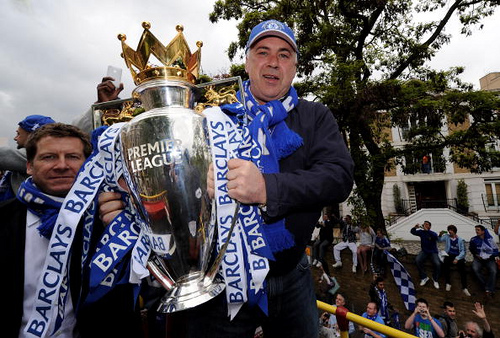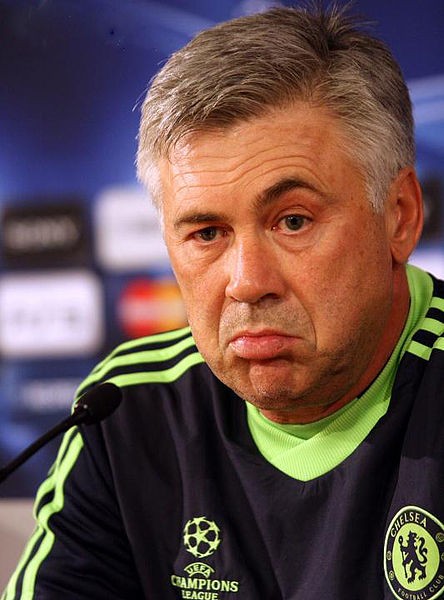Carlo Ancelotti was born and raised in a small farming town Reggiolo, near Parma. One month into his job at Stamford Bridge, he had this to say:
“My father was a farmer. I milked the cows and cut the trees and bushes. The most important produce was milk, which produced parmesan cheese. And the big lesson I learnt was to wait, to be patient. Because he who wants to produce parmesan today has to wait for at least one year before everything is ready for him to make cheese. You plant today and harvest one year or two years later. This is my philosophy with football. It’s my style, my way of life. You can’t be anxious for the result. If you’ve done the proper things it will come.“
When the sea is calm, even the most incompetent sailor can steer the ship to safety without even raising an eyebrow; however, what a sailor does in troubled waters truly marks his character.
If Roman Abramovich wanted to fire Carlo Ancelotti, by now the Italian would have been well settled, leading a laid-back life back in Reggiolo, producing parmesan cheese. In his free time, he would have dwelt upon what went wrong in West London.

However, the fact that he’s still here indicates that Roman has given his man time till the end of season. The book titled “The Tale of Ancelotti and Chelsea” is still being written; the number of pages in the book or the nature of its ending is still undecided. Carlo Ancelotti faces arguably his toughest test yet in football, as the Bridge has witnessed bigger men fall at smaller hurdles. His legacy depends on what his team does in the next five months.
So, here’s the big question: What should Carlo do?
Sign a player in January
No, not for increasing the fan-base by adding a “marquee” signing, but for bringing a sense of competition back in the first team. The fallen stars need to be kept on their toes. We don’t have to look beyond Chelsea to search for examples wherein a new signing brought the best out of his incumbent. Yuri Zhirkov’s signing was like a kiss which transformed Florent Malouda into Prince Charming, while the summer recruitment of Ramires forced Mikel to begin this season as the best passer in the Premiership.
The first team players are not performing well. This is not earth-shattering news, but the fact that they have started taking their place in the team for granted, as they don’t see anyone else being a threat, is indeed alarming. The players have forgotten what it means to play for the shirt. In the Roman era, Chelsea has never had such a small squad. As it stands, poor Carlo has only 19-somethings to call upon to change the game, and the big players don’t see them as competition. Didier Drogba has only Daniel Sturridge breathing down his neck, and the Englishman is not exactly a similar player. Florent Malouda and Nicolas Anelka have Salomon Kalou and Gael Kakuta to worry about, the former is at best an impact sub while the latter is still learning his trade. Such examples can be found across the pitch, and this is indeed a cause for concern.
The only good thing about Chelsea’s horrendous form is that it has coincided with the January transfer window. Although the Blues don’t have a reliable replacement for Cech, or appear to be thin at the heart of defence, the one signing they really need now is an attacking one, to breathe life back into their rotting front-line.
Alexis Sanchez, the 23-year old Chilean footballer who plays in Italy for Udinese, is primarily a right winger but can also play as an attacking midfielder or as a striker. Although the move would be difficult to pull off, with clubs such as Inter and Man United after him, should it transpire, it would be enough to wake Anelka, kalou and Sturridge up from their slumber. £15m is a good price to pay for a young and exciting talent like Sanchez.
The 4-3-3 has become predictable and needs to be changed
Ancelotti, in his first season as the Bridge, realized that his preferred midfield diamond is not working at Chelsea, and switched to a 4-3-3 to suit his new team. Presently, the situation is worse. The writing has been on the wall for a while, and the Italian has to rethink his strategy; even teams struck in the relegation quagmire know how to defeat the Blues. They pin Chelsea’s fullbacks down with advanced wingers, slug it out in the midfield by chasing every ball and closing down the midfielders, and isolate Drogba by closely marking him. For long, the Londoners have shaped up on the pitch in a formation that demanded traditional wide players, by fielding out-of-position strikers, but now this tactic is way past its sell-by date, and needs to be shaken up.
4-2-1-3 is a formation which is different from the widely used 4-2-3-1. Jonathan Wilson, in his article for The Guardian, had clearly explained the difference. Let’s see how this can be deployed at Chelsea and what difference can it make. This particular formation uses two flat holding players, and Essien and Mikel, who perform much better while playing alongside each other, can be used for the two positions. Compared to the 4-2-3-1, in the 4-2-1-3 the playmaker plays a withdrawn role, more closer to the holding players and the wide players play further upfield, rather than alongside him. So the playmaker has three options in front of him. At Chelsea, Lampard can play this role.
In the present system, our wide players more often than not try to cut inside, with an aim to drag the opposition fullbacks along with them, thus freeing up space for the likes of Cole and Bosingwa to overlap. But this also ends up congesting the central areas, reducing the space for Didier Drogba. Chelsea needs wingers who can utilise the flanks to deliver crosses to the centre-forward, rather than be predictable by cutting in all the time. Chelsea have Malouda and Kakuta to play on the left, and if they can sign someone like Sanchez to play on the right, the formation can work for them. At least, it will give the other teams something different to chew on.
Demand for a trustworthy lieutenant who knows his football
The Ray Wilkins saga has already been widely debated, so there’s no point delving into that again. However, both Paul Clement and Michael Emanalo have not been able to fill the void left by the departure of the likeable Englishman. Ancelotti needs someone who understands Chelsea, who understands the players, who understands the fans, who is comfortable with English as well as with Italian, and who also has some managerial experience under his belt. If you have not guessed it yet, he needs to bring in someone like Gianfranco Zola.
Time for him to return home.
Zola was fired by West Ham in May, 2010, and is presently out of a job. Such an appointment will not only rejuvenate the dressing room but will also aid Ancelotti; moreover, the two Italians know each other from their time at Parma. The Chelsea board can also be expected to welcome the move to bring the ‘Greatest Chelsea player of all time’ back to where he belongs.
Set realistic and short-term targets
The over-ambitious statements, by the manager as well as by the players, are not helping the cause. What Carlo needs to do is set realistic and short term targets for the team. Only after the first goal is accomplished, should he think about the next. For now, the goal should be three-fold. First, begin the FA Cup defence on a positive note by winning comfortably against Ipswich. Second, resurrect the league campaign to cement a top-four finish, and finally, reach the Champions League quarterfinals.
Carlo Ancelotti is one of the most humble and graceful personalities in football, and anybody who has a stable head on his shoulders would not like to see a good man fall. Courtesy his double-winning exploits and calm demeanor, he had won over a considerable section of the Chelsea fan-base, fans who are willing to stand by him during these difficult times. These are the fans who yearn for stability at the club, and who want him to make the Chelsea job his own. If Carlo can steer Chelsea away from these troubled waters, he could most definitely end up establishing a legacy at Stamford Bridge. However, whether he can or can’t, remains to be seen.
Ancelotti should take a moment before the next match to read the famous words of William Ernest Henley from the poem Invictus: “I am the master of my fate, I am the captain of my soul.”
